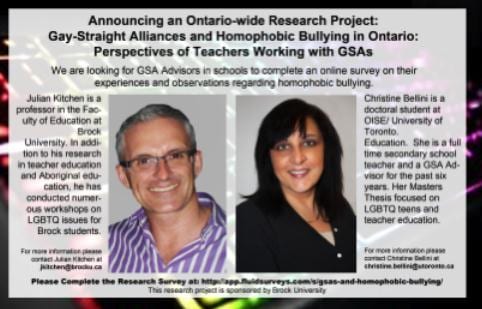Christine Bellini is on a hunt to find Ontario’s gay-straight alliances.
She’s working with Julian Kitchen on a research project about GSAs in Ontario public schools. Their goal: document the experiences of GSA advisors across the province. Bellini is finding it easier said than done.
“The first stumbling block is just even to find out who are those GSA advisors?” she says. In previous work, the only way Bellini could find information about new GSAs was from newspaper articles. “Every once in a while there’d be an article — and they’re not necessarily positive . . . about how one school tried to start a GSA and wasn’t allowed.”
Bellini says no academic discussion has been undertaken with teachers who’ve started GSAs in rural or northern Ontario. “There are GSAs in Sudbury, North Bay,” she says. “Has anybody ever talked to those teachers and said, “How did you start it, what was the response from the school board, what’s the response from parents?”
Bellini says lots of people are discussing kids’ experiences in GSAs. She points to Every Class in Every School, a national Egale Canada survey of students in 2011. She hopes her study, sponsored by Brock University, will give teachers a voice, too.
Bellini also wants her research to create a “historical document” that will help students and teachers form their own GSAs.
“Right now we have a [Ontario] government that is really . . . promoting GSAs as a club that will sort of stop or end homophobia in schools, because they see them as part of a climate,” she says. “Are GSAs really doing what we’re thinking they’re doing? I’m not sure. Are they social clubs? Are they really helping to control homophobia in schools?”
Kitchen says, from their first stages of research, the answer seems to be “yes.”
“Rather than safe schools making a safe place for gay kids, it may actually be that a school that has a GSA and makes an effort to support LGBT kids is a safer place for everyone as well,” he says. “When you actually target, supporting the group that’s most likely to be victimized in that particular school, you don’t tolerate homophobic language and so on, that can make a big difference.”
While GSAs can make schools feel safer, teachers who advise them don’t always have it easy. Kitchen quotes one research participant: “I received anonymous messages regarding my involvement in the ‘Gay Agenda’ as well as Bibles sent to me . . . As we were just establishing the GSA it was very discouraging when we had to continually justify our existence and the need for it. Every activity that we did was scrutinized far beyond how other clubs and groups were.”
For Bellini, who teaches and works with a GSA at a Toronto high school, these challenges hit home. “My brother’s gay, and he did not have a GSA when he went to high school back in the ’70s,” she says. “But when I first became a teacher I could tell it was not easy . . . it was a very conservative environment.”
If you’re a teacher who advises a GSA, you can participate in the survey here.


 Why you can trust Xtra
Why you can trust Xtra


